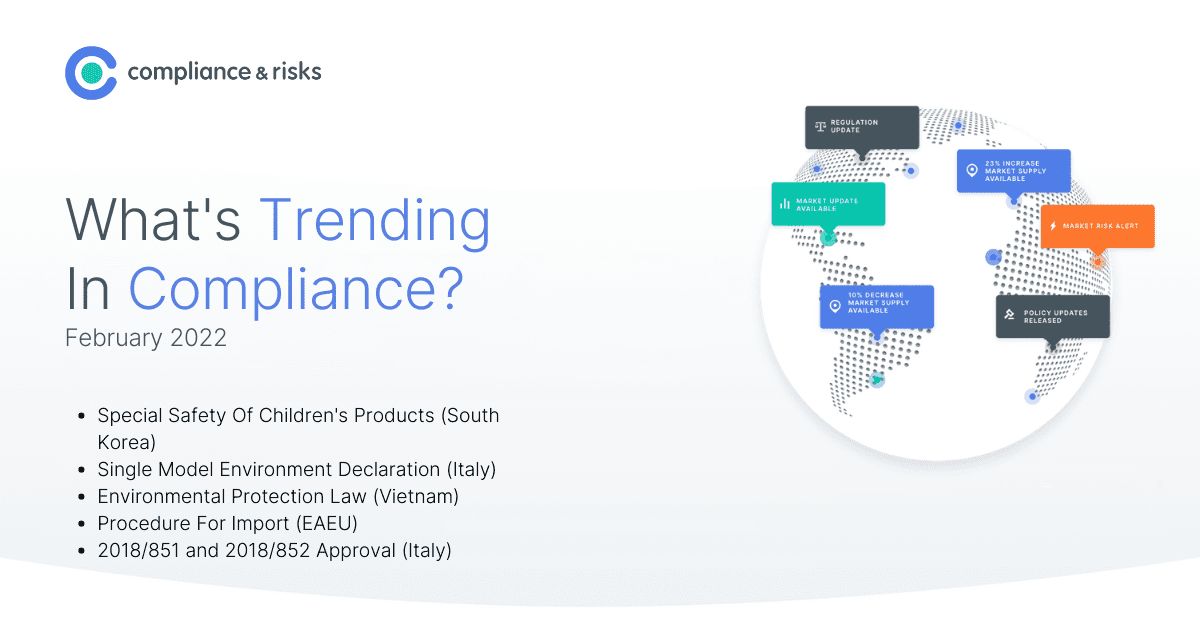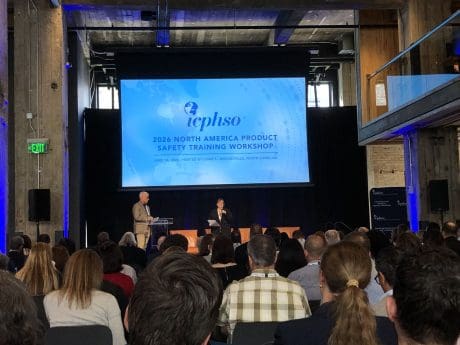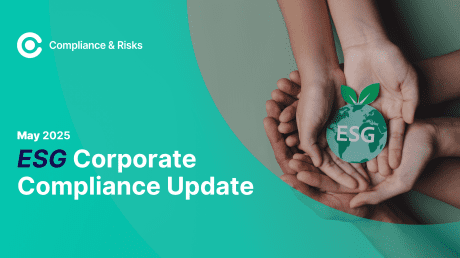
What’s Trending In Compliance? (February 2022)

At Compliance & Risks we help manufacturers, retailers and their supply chain partners to monitor and manage global regulations via C2P, our compliance knowledge management platform.
These are some of the top trending topics that generated the most interest in the last month.
1. South Korea: Special Safety of Children’s Products, Act No. 12733, 2014 – Amendment – (on cancellation of declaration of safety confirmation for children’s products, etc) Act No. 18819, 2022
On 3 February 2022, the South Korean National Assembly issued an amendment to the Special Act on Safety of Children’s Products.
The amendment was issued to add new provisions for the revocation of the declaration of safety confirmation for children’s products. Specifically, if manufacturers or importers of children’s products subject to safety confirmation fall under the newly stipulated conditions, they may be subject to a disposition of ineffectiveness of the safety confirmation report or an order to prohibit the use of the safety confirmation mark or to improve it. The new conditions are as follows:
- in case the safety confirmation report is made by false or other illegal means;
- if the product does not meet the safety standards;
- in case the safety conformity mark is not indicated or is falsely indicated.
This act enters into force on 4 August 2022.
2. Italy: Adoption of a Single Model Environmental Declaration for 2022, Decree, 17 December 2021
By Decree of 17 December 2021, the Italian President of the Council of Ministers adopted the Single Model Environmental Declaration for the year 2022.
The Model, included in the Annexes, must be used to submit environmental declarations relating to the data of the previous calendar year. The Model must be submitted by waste generators and handlers by 21 May 2022.
The 2022 Model, same as previous years, covers data relating to the generation and treatment of waste with regard to the following six categories: waste, end-of-life vehicles, packaging, E-waste, urban waste and manufacturers of EEE, as indicated in Annex 1.
The Decree enters into force on 5 February 2022.
3. Vietnam: Implementing the Environmental Protection Law, Decree No. 08/2022/ND-CP
On 10 January 2022, the Vietnamese Government issued Decree No. 08/2022/ND-CP providing guidance on the provisions of Law No. 72/2020/QH14 on Environmental Protection. The Decree sets out key policy actions to improve environmental protection and describes the roadmap and responsibilities to support the transition to the Circular Economy and contains various provisions to phase-out the use of single-use plastic and implement extended producer responsibility schemes for certain products and packaging.
Section 3 of Chapter IV (Art. 38-41) deals with persistent pollutants (POPs). Inter alia, products, goods, and equipment containing persistent pollutants must be labelled and disclose information in accordance with Article 39. Organisations and individuals that import, produce, and use POPs listed in Appendix XVII shall also register with the Ministry of Natural Resources and Environment.
Article 64 deals with single-use and non-degradable plastic products and packaging. Non-biodegradable plastic products and packaging, and products containing micro-plastics must be labelled in Vietnamese with the appropriate information before being placed on the market.
From January 1, 2026, the production and import of non-biodegradable plastic bags with dimensions smaller than 50 cm x 50 cm and a film thickness of less than 50 μm will be prohibited. Organisations and individuals that manufacture and import single-use plastic products and non-biodegradable plastic packages shall be responsible for recycling and handling plastic waste in accordance with the provisions of the Decree.
The Decree provides for the progressive phase-out of single-use plastic products, non-biodegradable plastic packaging and products containing microplastics. From December 31, 2030, the production and import of single-use plastics products (except for products certified with Vietnam’s eco-label), non-biodegradable plastic packaging (incl. non-biodegradable plastic bags), biodegradable plastic packaging and goods containing microplastics will be prohibited.
Chapter VI makes manufacturers and importers of the products (incl. packaging) specified in Annex XXII responsible for their recycling. This includes waste electrical and electronic equipment (light bulbs, solar panels, refrigeration equipment, mobile phones, cameras, televisions, appliances, air conditioning equipment, etc.), batteries, vehicles (incl. motorcycles and e-bikes), machinery, and packaging.
The compulsory recycling rates for each type of product and packaging are specified in Annex XXII.
Manufacturers and importers need to register recycling plans and report recycling results annually before March 31, and pay a contribution to the Environmental Protection Fund to support recycling. Manufacturers and importers are responsible for marking and labelling their products and packaging to facilitate recycling.
Chapter X, section 3 outlines the roadmap and key government actions to transition to the Circular Economy. Per article 138, the transition to the Circular Economy shall be based on the following criteria:
- increasing water and energy efficiency in production processes;
- extending the life-span of products, equipment and their components; including through reuse, repair (repair or maintain defective products to increase their service life); refurbishment (restore and upgrade old products), remanufacturing (using components, components, components of waste products for similar functions); change of intended use (using discarded products or components and components for new products with other functions);
- reducing of waste generation and associated impacts on the environment (i.e. solid waste, wastewater, harmful chemicals);
- collection , storage and treatment of rainwater for reuse;
- reducing single-use plastic products.
This Decree came into force on 10 January 2022.
4. EAEU: Procedure for the Import of Products Subject to Mandatory Conformity Assessment, Decision No. 130, 2021
On 12 November 2021, the Council of the Eurasian Economic Commission adopted this Decision to establish a new procedure for the import into the territory of the EAEU of products subject to mandatory conformity assessment.
This Decision establishes that all goods included in the Unified List of Products Subject to Mandatory Requirements of the Customs Union approved by the Decision of the Customs Union Commission No. 526, 2011, should comply with the technical regulations relating to the import procedure in the form of state registration or sanitary-epidemiologic and hygienic expertise, established by the Decisions of the Customs Union Commission No. 299, 2010 and No. 317, 2010.
The new Procedure:
1.) Defines the products that may be imported into the territory of the EAEU without proof of compliance with the technical regulations (Section 3).
2.) Lists the documents required to demonstrate the conformity of products subject to mandatory requirements to the technical regulations (Section 4):
- Document on conformity assessment provided for by the technical regulations of the Union (certificate of conformity with the requirements of technical regulations of the Union, declaration of compliance with the requirements of technical regulations of the Union, certificate of classification of a small vessel, certificate of registration, type-approval of a vehicle or other document provided by technical regulations of the Union);
- Document on conformity assessment provided for by the legislation of a member state, on the territory of which the products are placed under customs procedures, or a certificate of conformity or a declaration of conformity, drawn up in a single form for products subject to mandatory conformity assessment.
3.) Customs procedures required for the confirmation of compliance of imported products with the technical regulations (Section 5):
- Release for domestic consumption;
- Free custom zone. Special rules regarding the proof of compliance with technical regulations can be determined by the decision of the Council of the Eurasian Economic Commission;
- Imported products can be confiscated for the State;
- Special customs procedure (if compliance with technical regulation measures is a condition of placing a particular category of goods under the special customs procedure).
Compared to the Decision No. 294 of 2012, the following customs procedures have been eliminated:
- temporary importation,
- free warehouse,
- re-import.
A special customs procedure has been added.
4.) Establishes that the submission of the conformity assessment documents to the customs authorities when importing certain categories of goods or in special cases are not required (Section 6).
5.) Reduces the list of persons who can use conformity assessment documents of mass-produced products for customs declaration (Section 10).
This Decision repeals Decision No. 294 of 2012.
The Decision entered into force on 30 January 2022.
5. Italy: Environment Act, Legislative Decree No. 152/2006 and other – Amendment – (on implementing Circular Economy Directives (EU) 2018/851 and 2018/852) Legislative Decree No. 116/2020
On 3 September 2020, Legislative Decree No. 116 on the implementation of the Circular Economy Directives (EU) 2018/851 and 2018/852 was approved. The Decree makes various amendments to Italian environmental legislation in relation to extended producers responsibilities regarding waste and environmental labelling requirements for packaging.
In accordance with Article 219.5 of the Decree all packaging must be properly labelled according to procedures established by the applicable UNI standard techniques (specific standards are not listed however an overview of potentially relevant standards can be found on the CONAI link below) and the packaging material identification system outlined in EU Commission Decision 97/129/ EC. These measures have been adopted in order to facilitate the collection, reuse, recovery and recycling of packaging, and to provide consumers with proper information on the final destination of packaging.
Therefore, packaging producers shall ensure packaging is affixed with:
- alphanumeric codes provided for in Decision 97/129/EC on all packaging (primary, secondary and tertiary);
- suitable information aiding its disposal on packaging destined for consumers (business to consumers [B2C]);
Guidelines in English for the labelling of packaging have been provided by CONAI (the Italian PRO for packaging) and are available here. CONAI has also developed an online tool for the creation of labels which can be accessed here. Please note however, that the Italian Ministry of Ecological Transition shall enact, within 30 days of the entry into force of the labelling obligations, technical guidelines for the correct labelling of packaging, as specified in Decree-Law No. 228/2021.
Based on the interpretation of the requirements by CONAI, it is anticipated that business to business (B2B) packaging does not need to provide information on the final destination of the packaging, but must be affixed with the code of the packages material composition in accordance with Decision 129/97/EC.
In order to align with the provisions of the European Union’s framework regarding Circular Economy as reflected in EU Directives 2018/851 and 2018/852, the decree also makes minor amendments to the Collection of Municipal Waste Decree of 2008, for the disposal of waste derived from road cleaning.
The Decree entered into force on 26 September 2020, while packaging labelling requirements have been postponed until 30 June 2022 by Article 11 of Decree-Law No. 228/2021.
This information is based on the most viewed regulations on C2P this month. If you would like to find out more about how you can stay on top of global regulations, why don’t you Book a Demo today?
Market Insights straight to your inbox
Join 30,000+ product compliance & market access experts around the world








